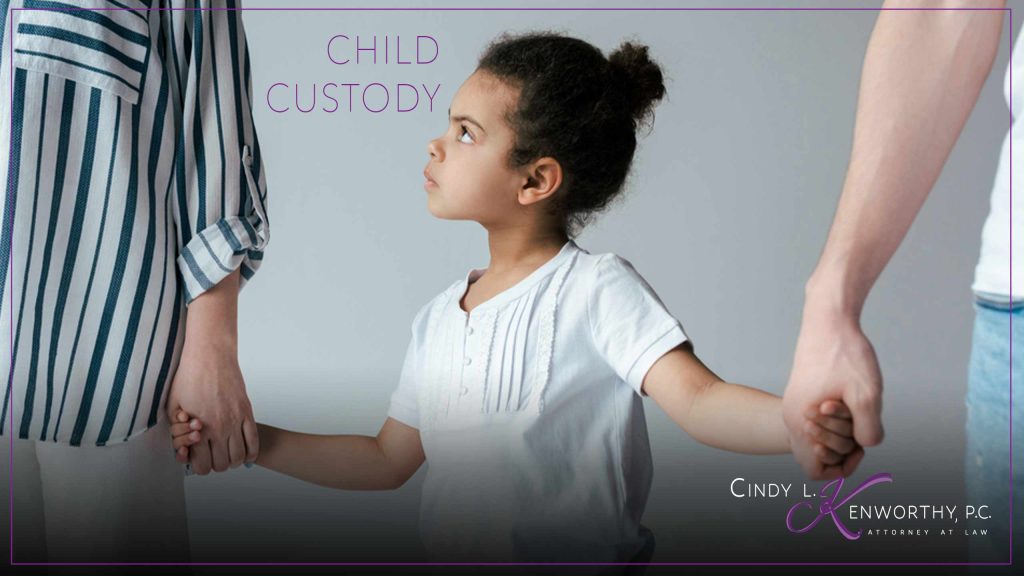Indianapolis Child Custody Lawyer
Child custody is the most emotional part of any divorce. When children are at the center of these cases, emotions tend to run high. Understandably, you want to do everything in your power to protect your children and do what’s best for them. When children are involved in a divorce, it’s especially important to choose the right attorney who will have your child’s best interests in mind. Whether you are facing a paternity issue, modification of custody, relocation, or any other child custody matter, the child custody lawyer at Cindy L. Kenworthy, P.C. is here to help.
Cindy L. Kenworthy, P.C. will take the time to get to know you and your case and to develop a personalized strategy to help you reach the most favorable outcome. Give me a call at 317-516-0515 or contact the firm online to see how I can help.
Defining Child Custody in Indiana
 In general, child custody refers to which parent has the legal right to raise and make major life decisions for a child. Indiana recognizes both sole custody, and joint legal custody where the parents share responsibilities regarding major life decisions and joint physical and legal custody.
In general, child custody refers to which parent has the legal right to raise and make major life decisions for a child. Indiana recognizes both sole custody, and joint legal custody where the parents share responsibilities regarding major life decisions and joint physical and legal custody.
The courts in Indiana would like parents to work out child custody agreements so that both parents can be involved in the child’s life. However, if this is not possible, a judge will get involved to resolve the matter with the child’s best interests in mind.
When child custody cases go to court, a judge will determine things such as who should have custody and have authority over decisions made concerning the child. A judge will also order parenting time and payment of child support.
These issues are complex and wrought with emotion, which is why it is often best to work with child custody lawyers who can help you navigate the process and defend your rights as a parent. A child custody attorney can also get involved to help you and your partner reach an agreement without getting the court involved.
Parenting Time Guidelines
 Unless a parent poses a physical or emotional threat to the child and regardless of who has physical custody, the time each parent spends with the child must be determined. This time is known as parenting time and allows both parents time in the child’s life. Parenting time is for the benefit of the child and the Indiana Parenting Time Guidelines (available online) attempts to provide a framework for the numerous and complex issues that surround parenting time. However, sole parenting time can be granted to one parent under certain circumstances.
Unless a parent poses a physical or emotional threat to the child and regardless of who has physical custody, the time each parent spends with the child must be determined. This time is known as parenting time and allows both parents time in the child’s life. Parenting time is for the benefit of the child and the Indiana Parenting Time Guidelines (available online) attempts to provide a framework for the numerous and complex issues that surround parenting time. However, sole parenting time can be granted to one parent under certain circumstances.
According to Indiana Parenting Time Guidelines, the purpose of parenting time is to “ensure more responsible parenting and to promote the healthy adjustment and growth of a child.”
Although the Guidelines are lengthy, the following is a brief excerpt:
- Communications
- Between the parents: Parents shall at all times keep each other advised of their home and work addresses, telephone numbers, and email addresses. Notice of any change in this information shall be given to the other parent in writing. All communications concerning a child shall be conducted between the parents. Any communication shall occur at reasonable times and places unless circumstances require otherwise. A child shall not be used to exchange documents or financial information between parents.
- With a child generally: A child and a parent shall be entitled to private communications without interference from the other parent. A child shall never be used by one parent to spy or report on the other. Each parent shall encourage the child to respect and love the other parent. Parents shall at all times avoid speaking negatively about each other in or near the presence of the child, and they shall firmly discourage such conduct by relatives or friends.
- With a child by telephone: Both parents shall have reasonable phone access to their child. Telephone communication with the child by either parent to the residence where the child is located shall be conducted at reasonable hours, shall be of reasonable duration, and at reasonable intervals, without interference from the other parent.
- With a child by mail: A parent and a child shall have a right to communicate privately by text, e-mail, and faxes, and by cards, letters, and packages, without interference by the other parent.
 Electronic communication: The same provisions above apply to electronic communications of any kind. However, these provisions shall not be construed to interfere with the authority of either parent to impose reasonable restrictions to a child’s access to the Internet.
Electronic communication: The same provisions above apply to electronic communications of any kind. However, these provisions shall not be construed to interfere with the authority of either parent to impose reasonable restrictions to a child’s access to the Internet.- Emergency notification: For emergency notification purposes, whenever a child travels out of the area with either parent, one of the following shall be provided to the other parent: An itinerary of travel dates, destinations, and places where the child or the traveling parent can be reached, or the name and telephone number of an available third person who knows where the child or parent may be located.
- Implementing Parenting Time
- Transportation: Unless otherwise agreed between the parents, the parent receiving the child shall provide transportation for the child at the start of the scheduled parenting time and the other parent shall provide transportation for the child at the end of the scheduled parenting time.
- Punctuality: Each parent shall have the child ready for exchange at the beginning and at the end of the scheduled parenting time and shall be on time in picking up and returning the child. The parents shall communicate as early as possible regarding any situation that would interfere with the timely exchange of the child. Both parents have a duty to communicate any time the exchange is delayed. When no communication is initiated by the delaying parent, and pick up or return of a child does not occur within a reasonable time, the time and conditions of the exchange may be rescheduled at a time and place convenient to the parent not responsible for the delay.
- Clothing: The custodial parent shall send an appropriate and adequate supply of clean clothing with the child and the non-custodial parent shall return such clothing in a clean condition. Each parent shall advise the other, as far in advance as possible, of any special activities so that the appropriate clothing may be available to the child.
- Privacy of residence: A parent may not enter the residence of the other, except by express permission of the other parent, regardless of whether a parent retains a property interest in the residence of the other. Accordingly, the child shall be picked up at the front entrance of the appropriate residence unless the parents agree otherwise. The person delivering the child shall not leave until the child is safely inside.
Again, these are just a few of the many guidelines the state of Indiana provides in the Indiana Parenting Time Guidelines. The complete Indiana Parenting Time Guidelines may be found at Indiana.gov.
How is Child Custody Determined?
 When you file for divorce, the court will take note if there are minor children involved and will require the parents to address, among other things, the issues of child custody and parenting time. If parents agree, a child custody and/or parenting time agreement may be filed with the court to review and order. If there is a dispute over child custody and/or parenting time, the court will then get involved and numerous factors will be taken into consideration.
When you file for divorce, the court will take note if there are minor children involved and will require the parents to address, among other things, the issues of child custody and parenting time. If parents agree, a child custody and/or parenting time agreement may be filed with the court to review and order. If there is a dispute over child custody and/or parenting time, the court will then get involved and numerous factors will be taken into consideration.
Factors that Influence An Award of Child Custody
When making a custody decision, the court will consider, among other things:
 The sex and age of the child
The sex and age of the child- The parents’ wishes
- The child’s wishes (if they are at least 14 years old)
- How the child interacts with each parent
- The living situation of each parent
- Special educational and medical needs the child might have
- The child’s adjustment to their current home, community, and school
- If there is any evidence of domestic or family violence by either of the parents
- The mental and physical health of the child and the parents
Child Custody Modification
Child custody agreements or Orders may be changed or modified depending on the circumstances. If your situation has changed and you wish to seek a child custody modification, you should contact the child custody attorney at Cindy L. Kenworthy, P.C. to discuss how best to move forward.
How Can A Indiana Child Custody Lawyer Help Me?
Child custody lawyers can help make the custody process go much smoother. They can assist you in reaching an out-of-court agreement without getting the court involved and they can also defend your rights and the rights of your child if the matter goes to court.
Overall, child custody attorneys can help with:
- Child custody agreements
- Enforcement of child support
- Enforcement of parenting time orders
- Modification of child support
- Modification of custody orders
- Paternity actions

Cindy L. Kenworthy, P.C. – Family Law Attorney – Protecting Your Rights
When you work with a family law attorney at Cindy L. Kenworthy, P.C., you can expect one-on-one attention to ensure the best possible outcome for your child custody case. Unlike large firms, I will make you a priority and your success is my goal.
I am here to guide you no matter where you are in the process with child custody or parenting time. Give me a call at 317-516-0515 or contact the firm online for a consultation.

